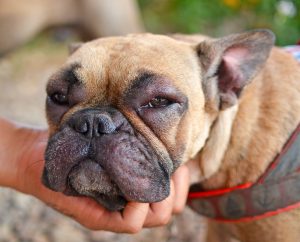-
Adopt
-
Veterinary Care
Services
Client Information
- What to Expect – Angell Boston
- Client Rights and Responsibilities
- Payments / Financial Assistance
- Pharmacy
- Client Policies
- Our Doctors
- Grief Support / Counseling
- Directions and Parking
- Helpful “How-to” Pet Care
Online Payments
Referrals
- Referral Forms/Contact
- Direct Connect
- Referring Veterinarian Portal
- Clinical Articles
- Partners in Care Newsletter
CE, Internships & Alumni Info
CE Seminar Schedule
Emergency: Boston
Emergency: Waltham
Poison Control Hotline
-
Programs & Resources
- Careers
-
Donate Now
 By Angela Mazza, DVM
By Angela Mazza, DVM
angell.org/generalmedicine
generalmedicine@angell.org
617-522-7282
Swollen faces, hives, vomiting, trouble breathing, collapsing. These are the most common symptoms of an allergic reaction. Just like people, pets can have allergic reactions. And just like people, in rare cases an allergic reaction can progress to an anaphylactic reaction which can be life threatening. Sometimes the inciting cause can be obvious, other times the trigger is unknown. Regardless it can be scary to see your pet in distress. Here are a few things to be aware of if you are concerned that your pet is having an allergic reaction.
 If you have any doubt about what your pet is experiencing, the safest thing to do is to seek immediate veterinary care. At minimum, a call should be placed to your veterinarian for advice. If you suspect that your pet’s eyes or muzzle is becoming swollen or you notice hives or welts along the body well or belly, you can start treatment for an allergic reaction with an anti-histamine, the most common being diphenhydramine (Benadryl). The typical dose is 1mg/pound of body weight. If your pet is overall stable and can swallow, an oral dose of diphenhydramine can be given at home. In the veterinary hospital setting, we most often use intramuscular injectable diphenhydramine as there is a faster onset of action especially if the pet has any vomiting associated with the allergic reaction. Depending on the pet’s presentation and extent of symptoms, other medications and treatments may be needed to stabilize the reaction and prevent it from progressing to a more serious life threatening situation. Some of these treatments include steroids, intravenous fluids and epinephrine. It may be recommended for your pet to stay under veterinary supervision for several hours after they are stabilized and often, it is recommended to continue oral diphenhydramine and/or steroids for a day or two after stabilization.
If you have any doubt about what your pet is experiencing, the safest thing to do is to seek immediate veterinary care. At minimum, a call should be placed to your veterinarian for advice. If you suspect that your pet’s eyes or muzzle is becoming swollen or you notice hives or welts along the body well or belly, you can start treatment for an allergic reaction with an anti-histamine, the most common being diphenhydramine (Benadryl). The typical dose is 1mg/pound of body weight. If your pet is overall stable and can swallow, an oral dose of diphenhydramine can be given at home. In the veterinary hospital setting, we most often use intramuscular injectable diphenhydramine as there is a faster onset of action especially if the pet has any vomiting associated with the allergic reaction. Depending on the pet’s presentation and extent of symptoms, other medications and treatments may be needed to stabilize the reaction and prevent it from progressing to a more serious life threatening situation. Some of these treatments include steroids, intravenous fluids and epinephrine. It may be recommended for your pet to stay under veterinary supervision for several hours after they are stabilized and often, it is recommended to continue oral diphenhydramine and/or steroids for a day or two after stabilization.
The take home message about allergic reactions is that they are serious and should be treated as such. Even if your pet has mild symptoms and responds to diphenhydramine alone, a follow-up evaluation or call should be done with your veterinarian. Symptoms can worsen with repeated exposures to allergens so you should always have an emergency plan in place. If your pet has had an allergic reaction to an environmental allergen such as a bee sting or other insect bite, it is prudent for owners to always have on hand oral Benadryl. After discussion with their veterinarian, the decision can be made as to whether a form of epinephrine should also be dispensed for emergency situations. For certain size dogs, an epi-pen could be appropriate. This is not common and tends to be utilized only in high risk cases. If you have any concerns about allergic reactions in your pet, please discuss with your veterinarian.